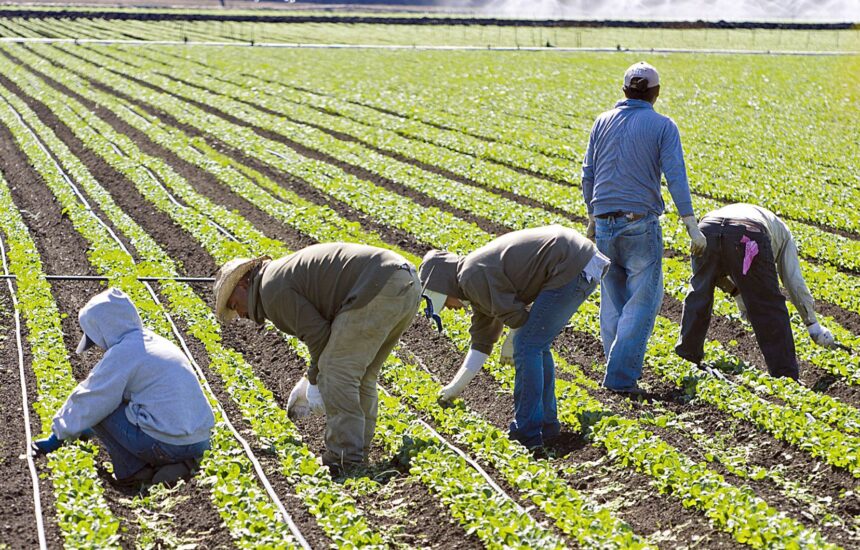No Legal Protection for Foreign Farm Workers in the U.S., Rules Kentucky Judge.
A federal court in Kentucky has blocked the Biden administration’s efforts to extend labor protections to foreign farm workers on H-2A visas, denying these essential workers the chance to assert their rights.
U.S. District Judge Danny Reeves ruled against the U.S. Department of Labor’s (DOL) proposed rule that would have allowed temporary farm workers to unionize.
The ruling, which applies to Kentucky, Ohio, West Virginia, and Alabama, highlights the legal limitations of the executive branch in altering labor laws without congressional approval.
Judge Reeves found that the DOL regulation improperly sought to grant H-2A workers collective bargaining rights, which are not provided to them under the National Labor Relations Act (NLRA). Historically, these rights have been reserved for U.S. workers, with foreign farm workers excluded since the NLRA’s inception.
In his written opinion, Judge Reeves criticized the DOL for exceeding its authority, arguing that the proposed rule framed its changes as protections against retaliation but effectively granted unionization rights without legislative authorization. He emphasized that such sweeping changes require congressional action rather than administrative regulation.
The plaintiffs, which included farmers and state attorneys general, argued that the regulation would impose undue financial and operational burdens on farm businesses. Kentucky Attorney General Russell Coleman labeled the rules as “illegal and unnecessary,” warning that they could disrupt food supply chains and increase costs for both farmers and consumers.
This decision joins a growing list of legal challenges to the DOL’s proposed rules. Earlier this year, a federal judge in Georgia blocked the same regulations in 17 Republican-led states. In that case, Judge Lisa Wood also ruled that Congress explicitly excluded farmworkers from the NLRA’s unionization rights.
The combined rulings from Kentucky and Georgia have created a fragmented regulatory landscape. While the DOL rules remain enforceable in some states, they are blocked in others, leading to inconsistencies in how H-2A protections are applied across the nation. Judge Reeves’ decision further complicates efforts to establish uniform labor protections for temporary agricultural workers.
The H-2A visa program, which allows U.S. employers to hire foreign workers for temporary agricultural jobs, has grown significantly in recent years. In fiscal year 2022, nearly 300,000 H-2A visas were issued, compared to fewer than 60,000 a decade earlier. These workers are indispensable to the agricultural sector, performing labor-intensive tasks such as planting, harvesting, and packing crops.
Despite their vital role, H-2A workers receive limited protections, leaving them vulnerable to exploitation. Supporters of the DOL’s proposed changes argue that unionization rights would enable these workers to negotiate better wages and working conditions. Critics, however, contend that such measures could increase costs and administrative burdens for farmers, potentially jeopardizing the program’s viability.
For farm workers, the court’s decision is a major setback in their pursuit of better labor protections. Without the right to unionize, many workers are likely to continue facing challenges such as low wages, poor working conditions, and limited recourse against employer retaliation.
For agricultural employers, the ruling alleviates concerns about the financial and logistical impacts of the proposed regulations. Farmers, particularly those running small and medium-sized businesses, argued that the changes would have imposed undue pressure on their operations.
Kentucky farmers’ associations welcomed Judge Reeves’ ruling as a safeguard for the agricultural industry. One farmer expressed relief, noting that the proposed rules could have made it difficult for many farms to remain operational.
The Biden administration’s efforts to extend protections to H-2A workers reflect broader initiatives to address inequities in the U.S. labor market. However, these court rulings underscore the challenges of implementing such changes through administrative actions.
As the legal battle continues, the federal government may appeal the rulings or seek alternative solutions to address the issue. In the meantime, the fragmented application of DOL rules creates uncertainty for both workers and employers navigating the complexities of the farm labor system.
Judge Reeves’ decision raises important questions about Congress’s role in shaping labor policy for foreign workers. While the administration’s intentions aim to remedy longstanding disparities, the courts have emphasized the necessity of legislative clarity on these issues.
The Kentucky ruling, along with similar decisions in other states, illustrates the ongoing tension between executive and legislative authority in the realm of labor rights. For immigrant workers and the agricultural sector, the outcome of this litigation will have lasting implications for the future of the H-2A program.
This text is based on information from the Latin Times and other sources.







